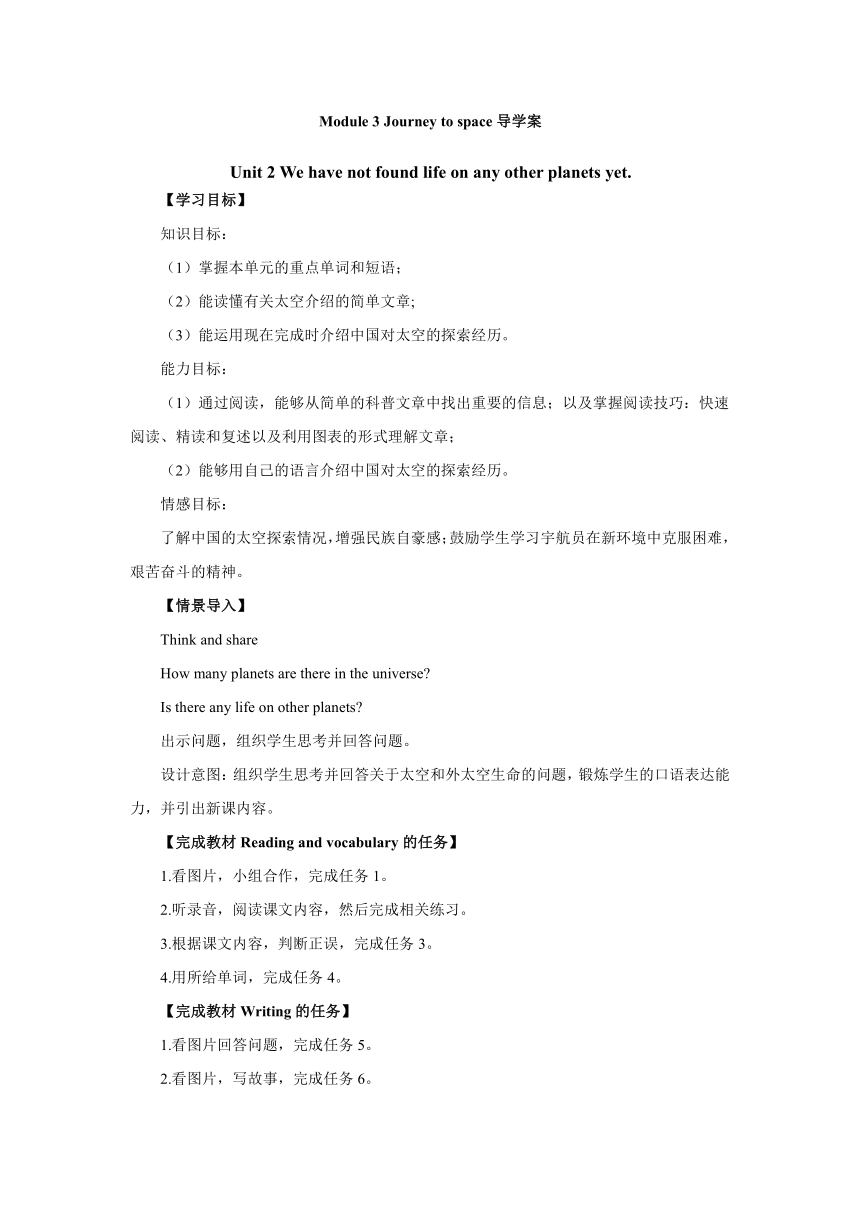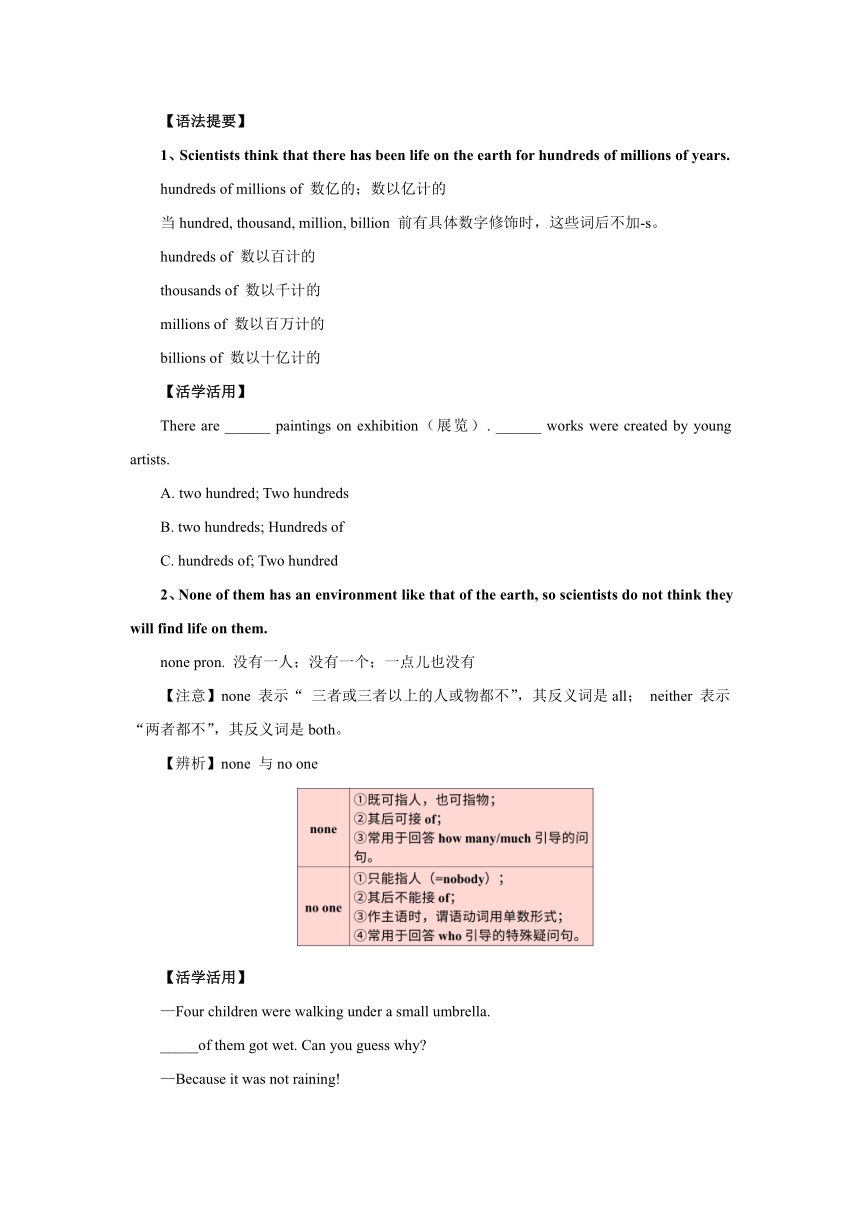外研版八年级下册Module 3 Journey to space Unit2 导学案 (无答案)
文档属性
| 名称 | 外研版八年级下册Module 3 Journey to space Unit2 导学案 (无答案) |

|
|
| 格式 | docx | ||
| 文件大小 | 71.6KB | ||
| 资源类型 | 教案 | ||
| 版本资源 | 外研版 | ||
| 科目 | 英语 | ||
| 更新时间 | 2024-05-31 00:00:00 | ||
图片预览


文档简介
Module 3 Journey to space导学案
Unit 2 We have not found life on any other planets yet.
【学习目标】
知识目标:
(1)掌握本单元的重点单词和短语;
(2)能读懂有关太空介绍的简单文章;
(3)能运用现在完成时介绍中国对太空的探索经历。
能力目标:
(1)通过阅读,能够从简单的科普文章中找出重要的信息;以及掌握阅读技巧:快速阅读、精读和复述以及利用图表的形式理解文章;
(2)能够用自己的语言介绍中国对太空的探索经历。
情感目标:
了解中国的太空探索情况,增强民族自豪感;鼓励学生学习宇航员在新环境中克服困难,艰苦奋斗的精神。
【情景导入】
Think and share
How many planets are there in the universe
Is there any life on other planets
出示问题,组织学生思考并回答问题。
设计意图:组织学生思考并回答关于太空和外太空生命的问题,锻炼学生的口语表达能力,并引出新课内容。
【完成教材Reading and vocabulary的任务】
1.看图片,小组合作,完成任务1。
2.听录音,阅读课文内容,然后完成相关练习。
3.根据课文内容,判断正误,完成任务3。
4.用所给单词,完成任务4。
【完成教材Writing的任务】
1.看图片回答问题,完成任务5。
2.看图片,写故事,完成任务6。
【语法提要】
1、Scientists think that there has been life on the earth for hundreds of millions of years.
hundreds of millions of 数亿的;数以亿计的
当hundred, thousand, million, billion 前有具体数字修饰时,这些词后不加-s。
hundreds of 数以百计的
thousands of 数以千计的
millions of 数以百万计的
billions of 数以十亿计的
【活学活用】
There are ______ paintings on exhibition(展览). ______ works were created by young artists.
A. two hundred; Two hundreds
B. two hundreds; Hundreds of
C. hundreds of; Two hundred
2、None of them has an environment like that of the earth, so scientists do not think they will find life on them.
none pron. 没有一人;没有一个;一点儿也没有
【注意】none 表示“ 三者或三者以上的人或物都不”,其反义词是all; neither 表示“两者都不”,其反义词是both。
【辨析】none 与no one
【活学活用】
—Four children were walking under a small umbrella.
_____of them got wet. Can you guess why
—Because it was not raining!
A. All B. None C. Most D. Some
3、None of them has an environment like that of the earth, so scientists do not think they will find life on them.
environment n. 环境
environment n. 环境
environmental adj. (有关)环境的
environmentalist n. 环境保护论者
【活学活用】
The idiom(成语)“Mengzi’s mother makes three moves” tells of a mother who did all she could to provide the best _____ for her child.
A. experience B. instruction
C. environment D. information
4、None of them has an environment like that of the earth, so scientists do not think they will find life on them.
that pron. 那,那个
that 用来特指前文提到的单个事物或不可数名词;特指前文提及的多个事物时用those。
【活学活用】
—How cold here!
—Yes. The weather in Guangyuan is much colder than_______ in your hometown.
A. that B. it C. this D. those
5、The sun and its planets are called the solar system...
一般现在时的被动语态
被动语态中常用 by 引出执行动作的人或物。
一般现在时被动语态的构成是:
be(am/is/are)+ 及物动词的过去分词。
【活学活用】
On our farm, the tea leaves _____ by hand when they are ready.
A. pick B. picked
C. are picked D. were picked
6、It is impossible to imagine.
impossible adj. (事情) 办不到的,不可能的
表示“不可能的”时,impossible 的主语不能是人,而只能是it 或事情。
It is impossible (for sb.)to do sth.
(对某人来说)做某事是不可能的。
possibly adv. 可能;或许
↑
possible adj. 可能的
↓
impossible adj. 不可能的
【活学活用】
用所给词的适当形式填空
These animals were able to break away from the rope whenever they wanted, but it was only because over time, they believed that it was just _____________(possible).
7、However, no spaceship has travelled far enough to reach other stars in our Galaxy.
enough adv. 充分地;足够地
adj. /adv. +enough
enough+n. 或 n. +enough
“...not + adj. + enough +to do sth.”常和 “too... to...”以及“so...that+ 否定形式的从句”互换。
【活学活用】
那位 62 岁的女士足够勇敢 , 从湖里救起了一位小伙子(完成译句)
The 62-year-old lady was brave _________ ________ save a young man in the lake.
8、Why has no one communicated with us
communicate v.(to exchange information, news, ideas, etc. with sb.) 沟通;交流;传递
【活学活用】
Mattew Chimudzi wants to study Chinese so that he can have a good _____________(communicate) with people in China one day.
Unit 2 We have not found life on any other planets yet.
【学习目标】
知识目标:
(1)掌握本单元的重点单词和短语;
(2)能读懂有关太空介绍的简单文章;
(3)能运用现在完成时介绍中国对太空的探索经历。
能力目标:
(1)通过阅读,能够从简单的科普文章中找出重要的信息;以及掌握阅读技巧:快速阅读、精读和复述以及利用图表的形式理解文章;
(2)能够用自己的语言介绍中国对太空的探索经历。
情感目标:
了解中国的太空探索情况,增强民族自豪感;鼓励学生学习宇航员在新环境中克服困难,艰苦奋斗的精神。
【情景导入】
Think and share
How many planets are there in the universe
Is there any life on other planets
出示问题,组织学生思考并回答问题。
设计意图:组织学生思考并回答关于太空和外太空生命的问题,锻炼学生的口语表达能力,并引出新课内容。
【完成教材Reading and vocabulary的任务】
1.看图片,小组合作,完成任务1。
2.听录音,阅读课文内容,然后完成相关练习。
3.根据课文内容,判断正误,完成任务3。
4.用所给单词,完成任务4。
【完成教材Writing的任务】
1.看图片回答问题,完成任务5。
2.看图片,写故事,完成任务6。
【语法提要】
1、Scientists think that there has been life on the earth for hundreds of millions of years.
hundreds of millions of 数亿的;数以亿计的
当hundred, thousand, million, billion 前有具体数字修饰时,这些词后不加-s。
hundreds of 数以百计的
thousands of 数以千计的
millions of 数以百万计的
billions of 数以十亿计的
【活学活用】
There are ______ paintings on exhibition(展览). ______ works were created by young artists.
A. two hundred; Two hundreds
B. two hundreds; Hundreds of
C. hundreds of; Two hundred
2、None of them has an environment like that of the earth, so scientists do not think they will find life on them.
none pron. 没有一人;没有一个;一点儿也没有
【注意】none 表示“ 三者或三者以上的人或物都不”,其反义词是all; neither 表示“两者都不”,其反义词是both。
【辨析】none 与no one
【活学活用】
—Four children were walking under a small umbrella.
_____of them got wet. Can you guess why
—Because it was not raining!
A. All B. None C. Most D. Some
3、None of them has an environment like that of the earth, so scientists do not think they will find life on them.
environment n. 环境
environment n. 环境
environmental adj. (有关)环境的
environmentalist n. 环境保护论者
【活学活用】
The idiom(成语)“Mengzi’s mother makes three moves” tells of a mother who did all she could to provide the best _____ for her child.
A. experience B. instruction
C. environment D. information
4、None of them has an environment like that of the earth, so scientists do not think they will find life on them.
that pron. 那,那个
that 用来特指前文提到的单个事物或不可数名词;特指前文提及的多个事物时用those。
【活学活用】
—How cold here!
—Yes. The weather in Guangyuan is much colder than_______ in your hometown.
A. that B. it C. this D. those
5、The sun and its planets are called the solar system...
一般现在时的被动语态
被动语态中常用 by 引出执行动作的人或物。
一般现在时被动语态的构成是:
be(am/is/are)+ 及物动词的过去分词。
【活学活用】
On our farm, the tea leaves _____ by hand when they are ready.
A. pick B. picked
C. are picked D. were picked
6、It is impossible to imagine.
impossible adj. (事情) 办不到的,不可能的
表示“不可能的”时,impossible 的主语不能是人,而只能是it 或事情。
It is impossible (for sb.)to do sth.
(对某人来说)做某事是不可能的。
possibly adv. 可能;或许
↑
possible adj. 可能的
↓
impossible adj. 不可能的
【活学活用】
用所给词的适当形式填空
These animals were able to break away from the rope whenever they wanted, but it was only because over time, they believed that it was just _____________(possible).
7、However, no spaceship has travelled far enough to reach other stars in our Galaxy.
enough adv. 充分地;足够地
adj. /adv. +enough
enough+n. 或 n. +enough
“...not + adj. + enough +to do sth.”常和 “too... to...”以及“so...that+ 否定形式的从句”互换。
【活学活用】
那位 62 岁的女士足够勇敢 , 从湖里救起了一位小伙子(完成译句)
The 62-year-old lady was brave _________ ________ save a young man in the lake.
8、Why has no one communicated with us
communicate v.(to exchange information, news, ideas, etc. with sb.) 沟通;交流;传递
【活学活用】
Mattew Chimudzi wants to study Chinese so that he can have a good _____________(communicate) with people in China one day.
同课章节目录
- Module 1 Feelings and impressions
- Unit 1 It smells delicious.
- Unit 2 I feel nervous when I speak Chinese .
- Unit 3 Language in use
- Module 2 Experiences
- Unit 1 I've also entered lots of speaking competi
- Unit 2 They have seen the Pyramids.
- Unit 3 Language in use
- Module 3 Journey to space
- Unit 1 Has it arrived yet?
- Unit 2 We have not found life on any other planet
- Unit 3 Language in use
- Module 4 Seeing the docto
- Unit 1 I haven't done much exercise since I got m
- Unit 2 We have played football for a year now
- Unit 3 Language in use
- Module 5 Cartoons
- Unit 1 It's time to watch a cartoon.
- Unit 2 Tintin has been popular for over eighty yea
- Unit 3 Language in use
- Revision module A
- Module 6 Hobbies
- Unit 1 Do you collect anything ?
- Unit 2 Hobbies can make you grow as a person.
- Unit 3 Language in use
- Module 7 Summer in Los Angeles
- Unit 1 Please write to me and send me some photos
- Unit 2 Fill out a form and come to learn English
- Unit 3 Language in use
- Module 8 Time off
- Unit 1 I can hardly believe we are in the city ce
- Unit 2 We thought somebody was moving about
- Unit 3 Language in use
- Module 9 Friendship
- Unit 1 Could I ask if you've mentioned this to he
- Unit 2 I believe that the world is what you think
- Unit 3 Language in use
- Module 10 On the radio
- Unit 1 I hope that you can join us one day
- Unit 2 It seemed that they were speaking to me in
- Unit 3 Language in use
- Revision module B
